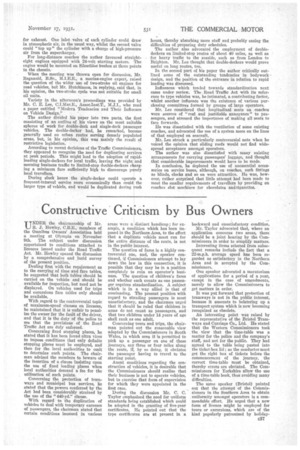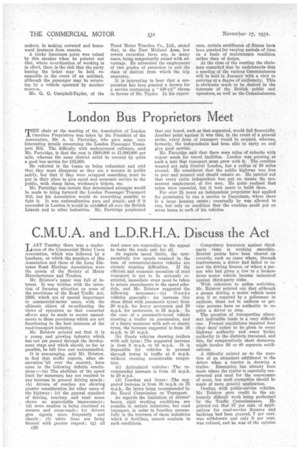Constructive Criticism by Bus Owners
Page 59

Page 60

If you've noticed an error in this article please click here to report it so we can fix it.
UNDER the chairmanship of Mr. J. Howley, C.B.E., members of the Omnibus Owners' Association held a meeting at Olympia on November 9th. The subject under discussion appertained to conditions attached to licences issued under the Road Traffic Act. Mr. Howley opened the discussion by a comprehensive and lucid survey of the present position.
Dealing first with the requirement as to the carrying of time and fare tables, he suggested that both tables should be carried on the vehicle and should be available for inspection, but need not be displayed. On vehicles used for trips and excursions fare tables only should be available.
With regard to the controversial topic of maximum-speed clauses on licences, he maintained that it is unfair to penalize the owner for the fault of the driver, and that it is the duty of the police to see that the provisions of the Road Traffic Act are duly enforced.
Concerning fixed stopping places, he stated that it has been found ultra vires to impose conditions that only definite stopping places must be employed, and then for the local authorities to omit to determine such points. The chairman advised the members to beware of the insertion of a clause insisting upon the use of fixed loading places when local authorities demand a fee for the utilization of such points.
Concerning the protection of tramways and municipal bus services, lie stated that the powers conferred by the Act had been considerably strained by the use of the "440-yd." clause.
With regard to the duplication of vehicles to deal with temporary excesses of passengers, the chairman stated that certain conditions imposed in various
areas were a distinct handicap ; for example, a condition which has been imposed in the Northern Area, to the effect that a duplicate vehicle must run for the entire distance of the route, is not in the public interest.
The question of fares is a highly controversial one, and, the speaker continued, if Commissioners attempt to lay down the law in this connection, it is possible that they may be in a position completely to ruin an operator's business. The question of children's fares and whether each counts as one passenger requires standardization. A subject which is in a way allied is that of overloading. The present position with regard to standing passengers is most unsatisfactory, and the chairman urged that it should be ruled that children in arms do not count as passengers, and that two children under 14 years of age shall rank as one adult.
Concerning tours and trips, the chairman pointed out the reasonable view adopted by the Commissioners in South Wales, in which area it is permitted to pick up a passenger on one of these journeys, say three or four miles along the route, if, by so doing, it obviates the passenger having to travel to the starting point.
Anent conditions regarding the construction of vehicles, it is desirable that the Commissioners should realize that their business is not to operate vehicles, but to exercise that form of supervision for which they were appointed in the first case.
During the discussion Mr. C. C. Taylor emphasized the need for uniform standards being established which could be adopted in the granting of five-year certificates. He pointed out that the type certificates are at present in a backward and unsatisfactory condition.
Mr. Taylor advocated that, where an application concerns two areas there should be a joint hearing by the Commissioners in order to simplify matters.
Interesting items selected from subsequent remarks include the fact that a 22-m.p.h. average speed has been regarded as satisfactory in the Northern Area and is accepted by the Commissioners.
One speaker advocated a moratorium of applications for a period of a year, except in the case of amendments, merely to allow the Commissioners to get matters in order.
It was put forward that protection of tramways is not in the public interest, because it amounts to bolstering up a transport system which is now becoming recognized as obsolete.
An interesting point was raised by the representative of the Bristol Tramways and Carriage Co., Ltd. He stated that the Western Commissioners took the view that the time-table was a matter for the police and the company's staff, and not for the public. They had agreed to the table being pasted into the ticket-box lid; as the conductor must get the right box of tickets before the commencement of the journey, the correct time-table must be obtained, thereby errors are obviated. The Commissioners for Yorkshire allow the use of a time-table book, thus avoiding many difficulties.
The same speaker (Bristol) pointed out that the attempt of the Commissioners in the Southern Area to obtain uniformity amongst operators is a commendable effort. He urged that a new form of licence might be employed for tours or excursions, which are of the kind popularly patronized by holiday makers, in making outward and homeward journeys from resorts.
A tricky insurance point was raised by this speaker when he pointed out that, where co-ordination of working is in effect, there is the risk that the party issuing the ticket may he held responsible in the event of an accident, although the passenger may be returning by a vehicle operated by another Concern.
Mr. G. C. Campbell-Taylor, of the Trent Motor Traction Co., Ltd., stated that, in the East Midland Area, low return excursion fares are, in many cases, being compulsorily raised with advantage. He advocated the employment of two grades of excursion to suit the class of district from which the trip emanates.
It is interesting to hear that a corporation has been granted a licence for a service containing a 440-yd." clause in favour of Mr. Taylor. In his expert
once, certain certificates of fitness heve been granted for varying periods of timeon a basis of maintenance condition rather than of design.
At the close of the meeting the chairman remarked that he understands that a meeting of the various Commissioners will be held in January with a view to arriving at a degree of uniformity. This is obviously much to be desired in the interests of the British public and operators, as well as the Commissioners.












































































































